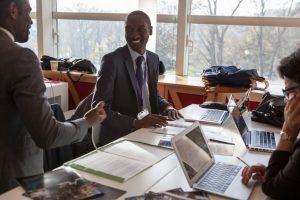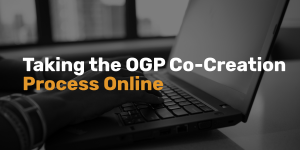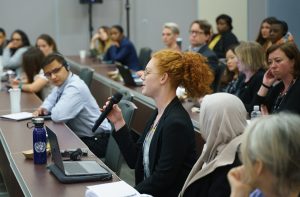Help Us Finalize the OGP Co-Creation and Participation Standards
Ayúdanos a finalizar los Estándares de participación y cocreación de OGP
The current Participation and Co-creation Standards were introduced in 2016 to improve the requirements for participation and quality of public consultations, and provide guidance on the ongoing dialogue between government and civil society throughout the OGP action planAction plans are at the core of a government’s participation in OGP. They are the product of a co-creation process in which government and civil society jointly develop commitments to open governmen... cycle. However, the current 60 standards often lead to overlaps, make the process too rigid at times, and create difficulty to follow and measure them. The use of proxy measures to identify the minimum requirementsAll OGP participating countries are expected to adhere to the Participation and Co-Creation Standards. Each Standard includes clear and measurable minimum requirements that all OGP participating count... also adds an unnecessary layer of complexity.
Over the last 24 months, the OGP Criteria and Standards Subcommittee and OGP Support Unit have consulted the global community, reviewed results from the first ten years of OGP, and debated the key elements that lead to strong results while enabling flexibility and innovation. This newer version of the Standards seeks to foster ambitionAccording to OGP’s Articles of Governance, OGP commitments should “stretch government practice beyond its current baseline with respect to key areas of open government.” Ambition captures the po... and clearly outline the minimum requirements that are expected from all participating countries. Furthermore, for the first time since OGP launched a decade ago, we are proposing for greater flexibility on the length and delivery date of action plans.
The new Participation and Co-creation Standards are structured very differently from the previous version. The introduction outlines the content, ambition and overarching principles (full text here). Five proposed standards follow, each dealing with a key component of the OGP action plan cycle:
- Standard 1: Establishing a space for ongoing dialogue and collaboration between government, civil society and other non-governmental stakeholders.
- Standard 2: Providing open, accessible and timely information about activities and progress within a member’s participation in OGP.
- Standard 3: Providing inclusive and informed opportunities for public participationGiving citizens opportunities to provide input into government decision-making leads to more effective governance, improved public service delivery, and more equitable outcomes. Technical specificatio... during co-creation of the action plan.
- Standard 4: Providing a reasoned responseOngoing dialogue between stakeholders during the development of an OGP action plan is critical to the plan’s success. Specifically, communicating back to stakeholders the ideas received and decision... and ensuring ongoing dialogue between government and civil society and other non-governmental stakeholders as appropriate during co-creation of the action plan
- Standard 5: Providing inclusive and informed opportunities for ongoing dialogue and collaboration during implementation and monitoring of the action plan
All standards have the same structure and include an outline of what ambition looks like, scope of application, guidelines on how to apply the standard, minimum requirements, and how compliance will be assessed.
The final section outlines the proposed new rules regarding action plan length and delivery dates. The proposal would allow for two and four-year action plans that can be delivered in two windows over the calendar year.
Now we want to hear from you. For the first time, we have developed a platform that allows the community to interact and comment on the proposed new standards. Make sure to register on the platform to leave comments on the five new standards and the action plan flexibility section.
The consultation process will close on 13 October 2021. A final version that incorporates the input received will be presented to the OGP Steering CommitteeThe Steering Committee is OGP’s executive decision-making body. Its role is to develop, promote and safeguard OGP’s values, principles and interests; establish OGP’s core ideas, policies, and ru... for approval. We will also publish a report on what we heard from the consultation process.
We look forward to your input!
Los Estándares de participación y cocreación actuales fueron creados en 2016 con el fin de mejorar los requisitos de participación y la calidad de las consultas públicas, además de orientar los diálogos que se llevan a cabo entre el gobierno y la sociedad civil a lo largo del ciclo del plan de acción de OGP. Sin embargo, los 60 estándares con los que actualmente contamos en ocasiones se traslapan, hacen que el proceso sea demasiado rígido y son difíciles de seguir y medir. Además, el uso de indicadores indirectos para identificar los requisitos mínimos implica una complejidad innecesaria.
Durante los últimos 24 meses, el Subcomité de Criterios y Estándares y la Unidad de Apoyo de OGP han consultado a la comunidad global, revisado los resultados de los primeros diez años de OGP y discutido los elementos más importantes que han llevado a resultados sólidos a pesar de ser flexibles e innovadores. La nueva versión de los estándares busca aumentar la ambición y definir claramente los requisitos mínimos que todos los países miembros deberán cumplir. Además, por primera vez desde que OGP inició hace una década, estamos proponiendo una mayor flexibilidad en la duración y fecha de entrega de los planes de acción.
Los nuevos Estándares de participación y cocreación están estructurados de forma muy diferente a la versión anterior. La introducción presenta el contenido, ambición y principios generales (consulta el texto completo aquí). A continuación, se definen cinco propuestas de estándares, uno por cada componente del ciclo del plan de acción de OGP:
- Estándar 1: Establecer un espacio para el diálogo y colaboración permanente entre el gobierno, la sociedad civil y otros actores no gubernamentales.
- Estándar 2: Proporcionar información abierta, accesible y puntual sobre las actividades y avances relacionados con la participación de la entidad en el proceso de OGP.
- Estándar 3: Ofrecer oportunidades al público de participar de forma incluyente e informada durante el proceso de cocreación del plan de acción.
- Estándar 4: Ofrecer una respuesta justificada y asegurar un diálogo constante entre el gobierno, la sociedad civil y otros actores no gubernamentales según sea necesario durante el proceso de cocreación del plan de acción.
- Estándar 5: Ofrecer oportunidades incluyentes e informadas para establecer un diálogo y colaboración durante la implementación y el monitoreo del plan de acción.
Todos los estándares tienen la misma estructura e incluyen una descripción del nivel de ambición, alcance de aplicación, pautas, requisitos mínimos y elementos para su evaluación.
La última sección describe las propuestas de nuevas reglas sobre la duración y fechas de entrega de los planes de acción. Esta propuesta plantea la posibilidad de crear planes a dos o cuatro años que se entregarían en dos ventanas distribuidas a lo largo del año.
Queremos saber tu opinión. Por primera vez, creamos una plataforma que le permite a la comunidad interactuar y enviar comentarios sobre la nueva propuesta de estándares. Regístrate en la plataforma y dinos tu opinión sobre los cinco nuevos estándares y la sección sobre flexibilidad del plan de acción.
El proceso de consulta estará abierto hasta el próximo 13 de octubre de 2021. La versión final, incluyendo los aportes enviados, se presentará al Comité Directivo para su aprobación. Además, publicaremos informe sobre las propuestas enviadas durante el proceso de consulta.
¡Esperamos tus comentarios!
Comments (5)
Nassi Baba Reply
Thanks! Very productive work has been done, but I do not believe it can be applied in authoritarian states.
Laura Carolina Arce Sosa Reply
Sugiero incorporar de forma expresa el enfoque de género e interseccional en los estándares 1 y 2. Lo anterior, considerando la marcada desigualdad que existe en la materias de participación y acceso a la información para las mujeres y otros grupos en situación de vulnerabilidad, así como la crisis de violencia hacia las mujeres que existe diversos países.
Majo Montiel Reply
Congratulations for this initiative! I shared some ideas for each standard.
Stephen Davenport Reply
Hi team,
Just posting this as a follow-up to feedback we provided a year or so ago…Happy to see you are reviewing the process and are open to serious changes in the co-creation process.
Summary: A number of open government experts came together to review the OGP’s co-creation process—as outlined in the “OGP Participation and Co-Creation Toolkit” and the “Taking the OGP Co-Creation Process Online” guides—with the objective of providing the OGP Support Unit with recommendations for improvement. Comments were provided and several meetings were held to allow the contributors to bounce around and crystalize their ideas. This document is a summary of their recommendations. PLEASE VIEW THE PDF THROUGH THE LINK BELOW.
Contributors
● Aichida Ul-Aflaha, World Bank
● Anthony Zacharzewski, Democratic Society
● Claire Davanne, World Bank
● Dave Algoso, Open CoLab
● Jonathan Fox, American University
● Josh Lerner, People Powered
● Kelly McBride, Democratic Society
● Marian Cramers, Democratic Society
● Najma Siddiqi, Consultant, World Bank
● Panthea Lee, Reboot
● Stephen Davenport, World Bank
● Thom Townsend, Open Ownership
● Tiago Peixoto, World Bank
Organization of Recommendations
● Recommendations are divided into thematic areas.
● Within each thematic area, recommendations are further divided into “strong recommendations” and “for consideration”.
○ Strong recommendations are those where a majority of contributors were in agreement or contributors felt particularly strongly, while “for consideration” recommendations are those where they may not have been wide agreement or strongly-held views.
● Underlined phrases sum up the main point of each recommendation, while sub-bullets provide additional detail.
PLEASE VIEW THE PDF THROUGH THE LINK BELOW.
https://bit.ly/3FDPVSv
Regards,
Steve Davenport
Global Lead, Anticorruption, Openness, and Transparency
World Bank Group
Leave a Reply
Related Content
 Challenges and Solutions
Challenges and Solutions
Reviewing OGP Processes for its Tenth Anniversary

Taking the OGP Co-Creation Process Online
Find practical tips, a curated list of online tools and platforms, and country examples to help take your OGP co-creation process online.
OGP Participation & Co-Creation Standards (2017)
Civic participation is a core component of open government, and an essential element of the national OGP cycle. The OGP Articles of Governance state that ‘OGP participants commit to developing…


Balqiaz khan Reply
Dear Respected Sir/Mss,
I hope you will be fine.Rural Infrastructure & Human Resource Development Organization (RIHRDO) is registered with Social Welfare Department under voluntary social welfare act 1961.the organization has implemented many projects/activities in Women Empowerment, Girls Education and Youth leadership in KPK since 2006 on self-help and with support of donors.The Organization is also active in All Districts KPK.
We expect that you and we could work together.We could resolve the basic issues of KP such like the issues of basic Education Problems.
we will work at our best according to your guide lines.Hope you will consider our request to work with you,and will be very grateful for your kindness.we will be waiting for your response regarding any work or activity given to us by your office.
Please enlist our organization RIHRDO (Rural Infrastructure and human Resource development organization) KP, in your Membership/ Cluster contact.we express interest to become member.Please inform us about future opportunities.
Contact Person Detail:
Name : Balqiaz khan marwat ( Executive Director )
Cell / Whatsapp: 03018082785
Email : [email protected]
we hope you will response our email at your earliest.
Please stay safe and take good care.
Regards,